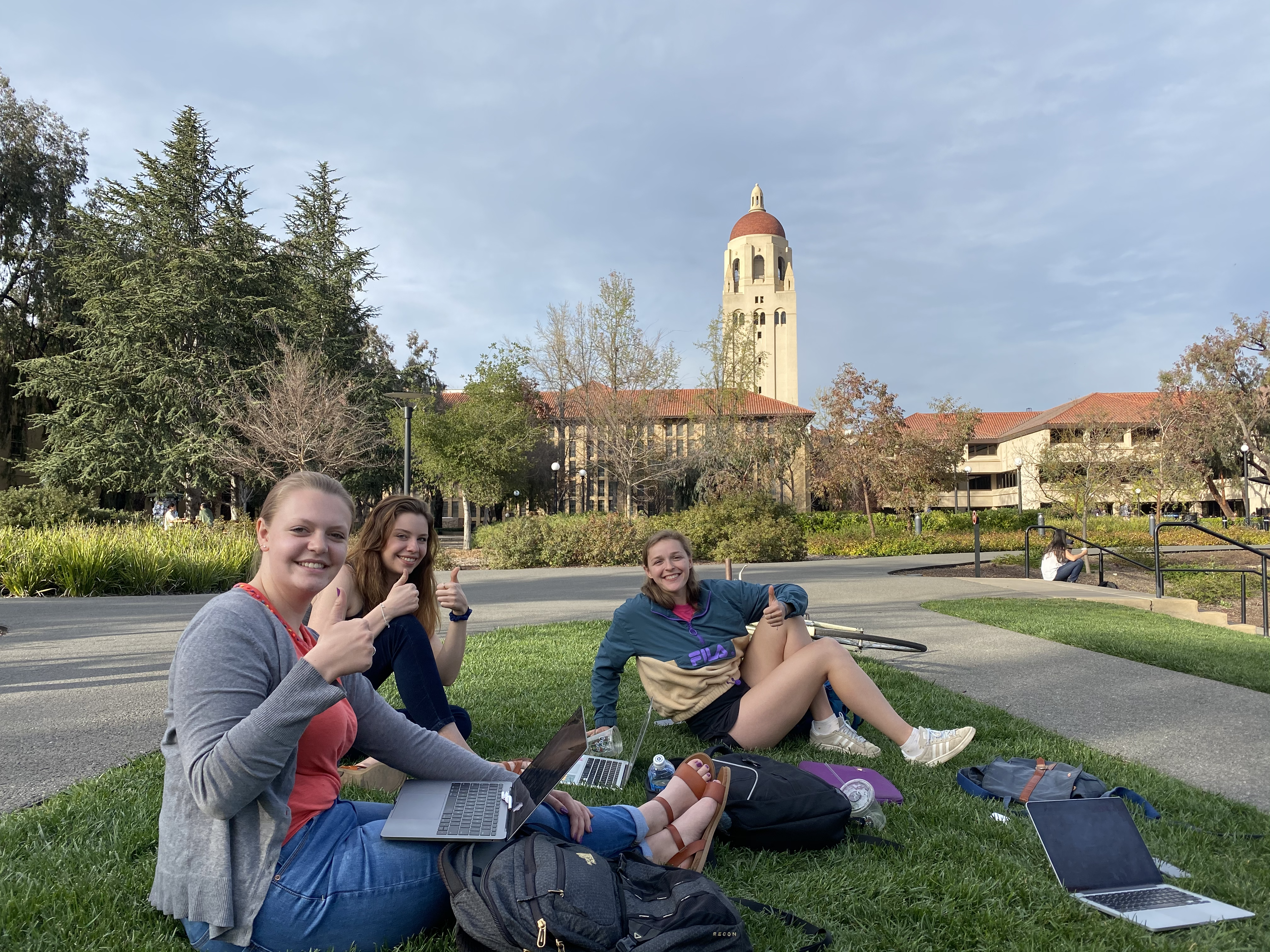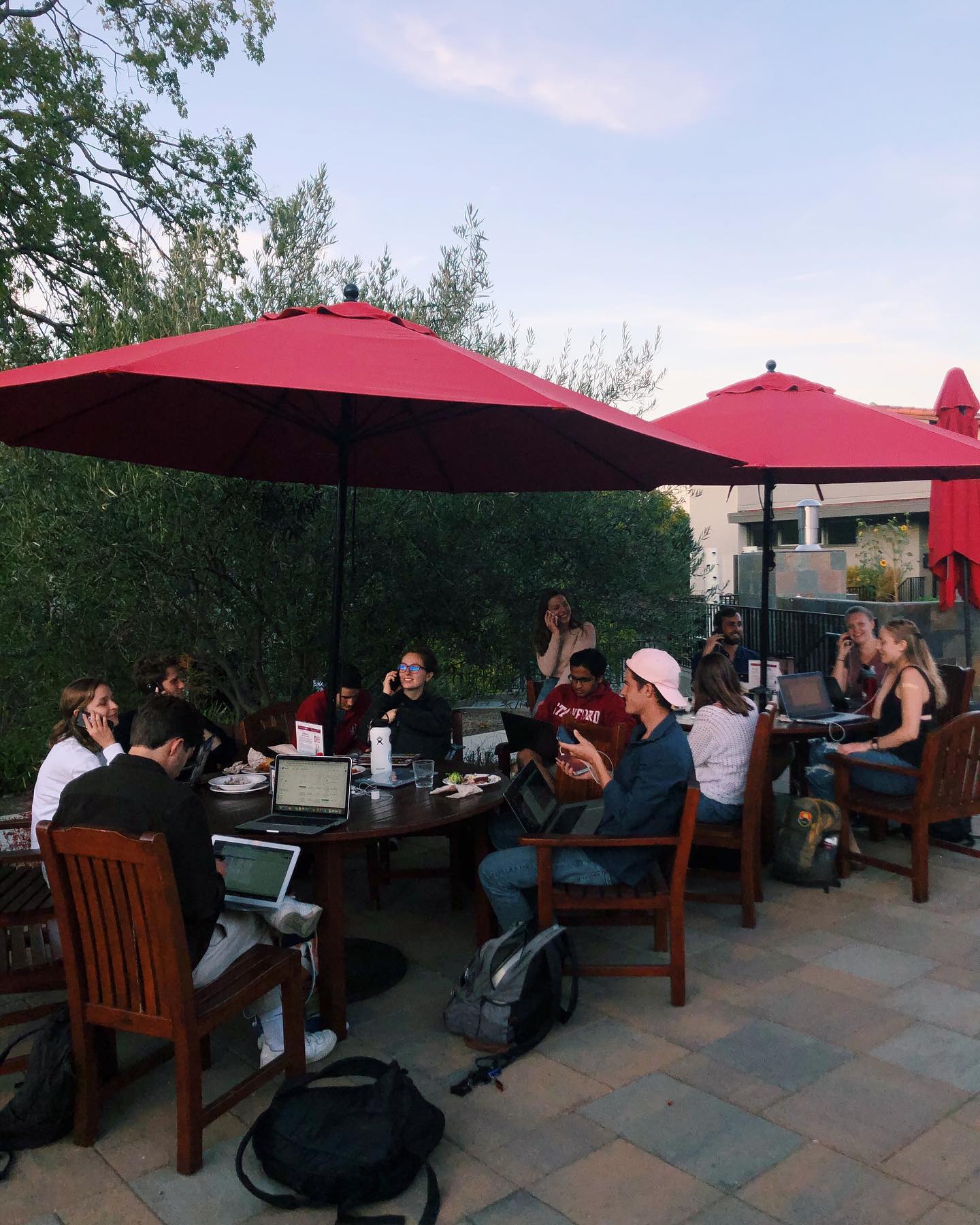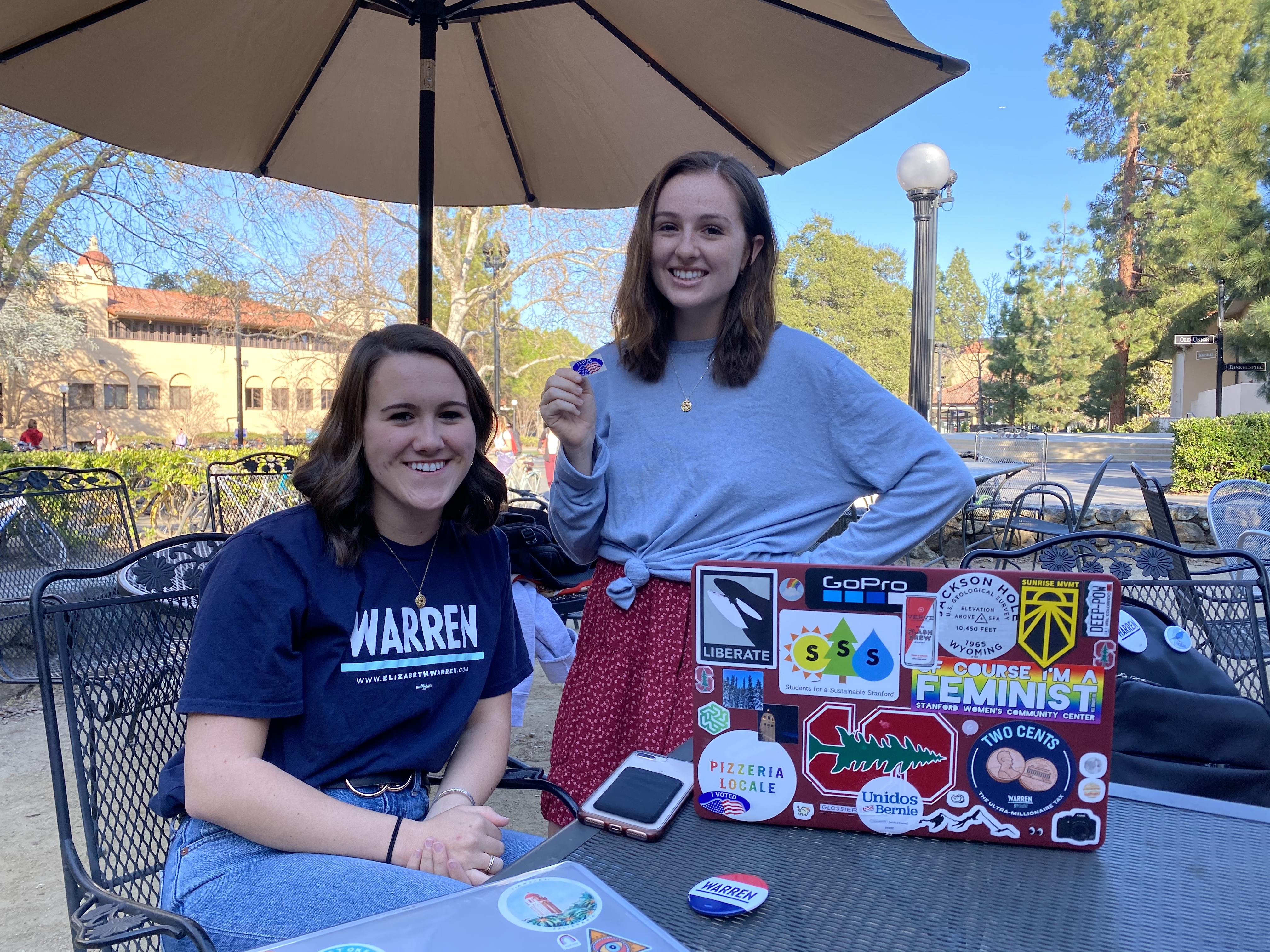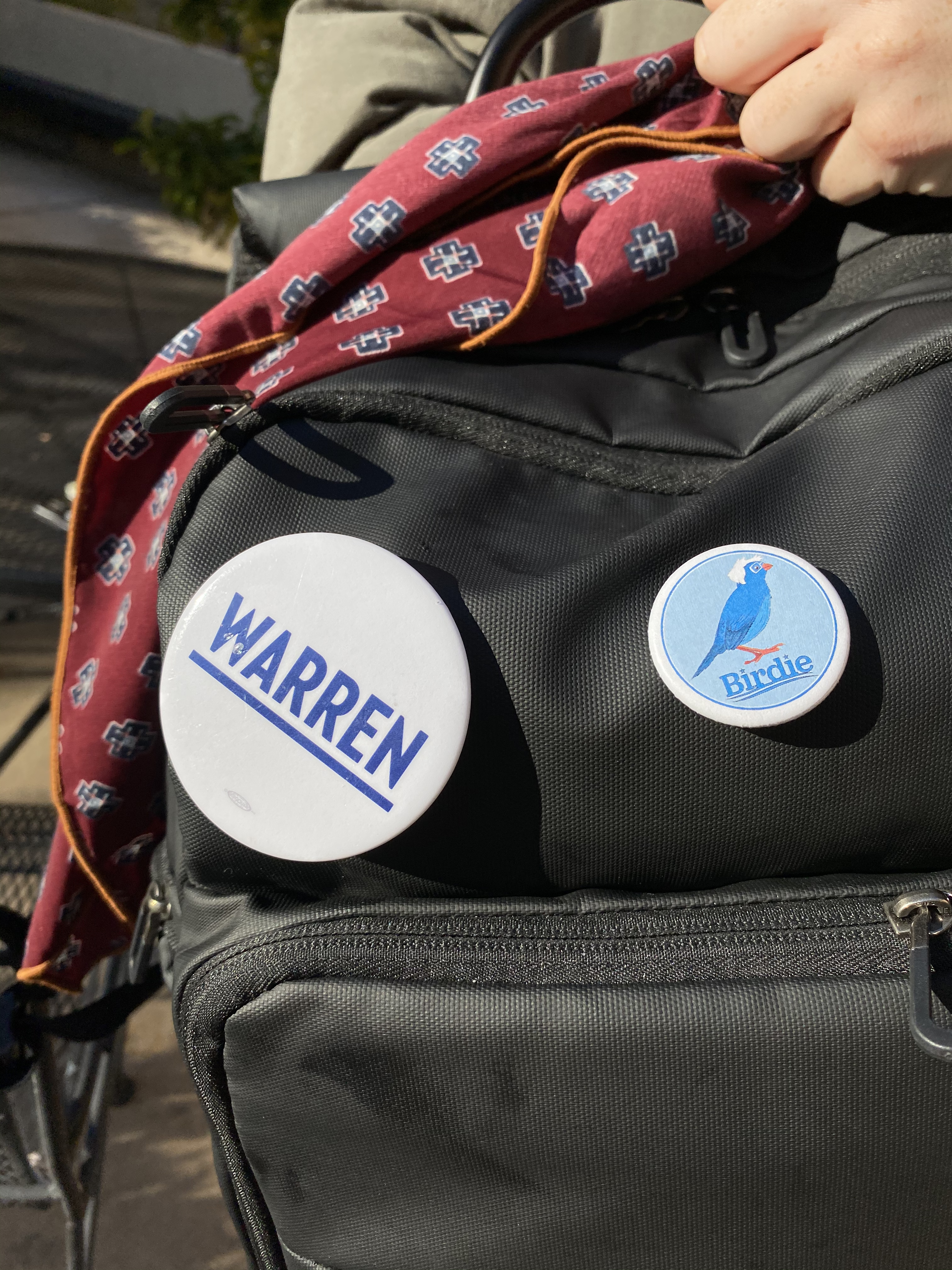It’s a sunny day on Meyer Green, an afternoon that manages to catch most students with a mixture of surprise and joy, particularly during winter quarter. It’s days like these that bring students out of their dorms, proclaiming that they “want to work outside today” with beach towels and laptops in tow.
“Hi Paul, this is Jordan with Elizabeth Warren’s campaign here in Santa Clara County,” says Jordan Payne ’20, speaking into her phone while sitting with a laptop on the edge of Meyer Green.
“I’m a volunteer, and I’m calling to let you know that I plan on voting for Liz next Tuesday, March 3 in the Democratic primary. I really believe in her bold and courageous future for America, and I hope you plan on voting for her on March 3. Have a great day!” she concludes, leaving a message.
It’s Friday, Feb. 28, and members of Cardinal for Warren are working outside as well, making their final phone-banking push before Super Tuesday. At one point a drone flew overhead, temporarily disrupting phone calls and reminding everyone involved that we were very much still on campus.
“I had a very frank conversation with someone who was clearly struggling,” Payne said. “Warren is his favorite candidate, but he’s wondering about whether he should be voting in a strategic way with the priority of getting Trump out of office.”
Six days later, Warren would end her campaign, leaving members of the Stanford chapter to grapple with these same questions about electability, sexism and how these may have ultimately played a role in her downfall.
Jordan Payne ’20, Chloe Stoddard ’21 and Madison Kenney ’20 phone-bank at Meyer Green on Friday, Feb 28. (Photo: BRYAN METZGER/The Stanford Daily)
A microcosm of a nation-wide campaign
Cardinal for Warren was born last August, following an email to interested Stanford students from the national campaign’s student coordinator. What started as a GroupMe quickly evolved into a series of Google Hangout sessions before ultimately materializing as a fully fledged student group in the early weeks of fall quarter. Free of any organized competition from other campaign chapters, Cardinal for Warren quickly attracted engagement and new members.
The makeup of the campus chapter looked a lot like Warren’s support base nationally: predominantly white, female and college educated, pending graduation. Most describe themselves as progressive, but chose Warren over other options such as Bernie Sanders because of Warren’s gender, her leadership style or the detailed nature of her policy proposals.
“I’m not going to lie that I would love to have a female president,” said Stoddard, the undergraduate chapter lead. Stoddard framed her initial choice as one between Sanders or Warren. Given that their agendas are so similar, she said, she was drawn to Warren by virtue of her gender, her “salt of the earth” appeal, and the steps she took to make amends for her prior claims of Native American heritage.
“I saw her be genuinely remorseful, and then actually address communities that could have been impacted negatively,” Stoddard said. “And then she took the further step of creating one of the most comprehensive plans to address the failure of the federal government and state governments in terms of how they’ve failed indigenous communities in the United States.”
“The reason I chose her over Bernie is primarily because she’s a woman,” Payne said, echoing Stoddard. She also mentioned her distaste for some other candidates in the race.
“I really get irked by people who are like, politicians from Day 1. You know who I’m talking about,” she added, with a smile. “Pete Buttigieg.”
Bryce Tuttle ’20, for his part, was drawn to Warren for more specific reasons. After a stint as an intern for Senator Dianne Feinstein (D-Calif.) where he worked on banking and finance issues, he came to agree with Warren’s positions on financial regulation after witnessing the Senate pass a tremendous giveaway to the financial industry.
“There just needs to be this massive realignment in how Washington talks about finance and financial regulation, and it needs to be prioritized,” Tuttle said.
Others were initially drawn in by what they perceived to be a highly organized campaign operation. While the Warren campaign had a presence early on, most other campaigns did not form campus chapters until later.
“Honestly, that’s probably why I’m a Warren supporter,” said Eleanor Schroeder ’22, remarking on the organization of the chapter. Coming from a rather politically involved family — her grandmother was close with then-Gov. Bill Clinton in Arkansas decades back, and her father even worked in the Clinton White House for some time — Cardinal for Warren represented a chance for Schroeder to take on a more active role in political organizing on her own terms.
“I’ve definitely learned how to advocate for a candidate,” she said.
Initially torn between supporting Elizabeth Warren or Bernie Sanders, Katherine Waissbluth ’22 also cited the existence of an established campus group.
“I think I was still on the fence when I joined, but Cardinal for Warren presented itself as an opportunity before any type of Bernie group,” Waissbluth said.
Members of Cardinal for Warren phone-bank for Elizabeth Warren. (Photo courtesy of Chloe Stoddard)
Growing pains
After an impressive start to the year, involvement with Cardinal for Warren began to level off. Such is the case with almost every student group on campus, as ever-increasing academic commitments force students to choose what to prioritize and groups see large-scale attrition. As members described it, Cardinal for Warren had shrunk from roughly 30 members down to 10 during a good week.
Yet such an atmosphere lent itself to an increasingly social environment, which became important as Warren’s own fortune in the polls began to decline.
“In some ways, it’s almost like a support group for people who are stressed out about the campaign,” Tuttle said.
The group met on Sundays at 7:30 p.m. in Hillel, using each meeting to take stock of the last week’s campaigning efforts, organize upcoming events, and discuss the state of the race. Each meeting began with a presentation from Stoddard called “She’s Got a Plan for That,” which featured a presentation of the latest plan Warren had released on issues ranging from healthcare, to housing, to climate change.
Throughout our conversations, many group members reflected on the challenges of being an unofficial student group, including regulatory barriers to political organizing on campus and a lack of funding to run the club.
“We have this very heavy table that we lug from Hillel all the time,” said Payne, explaining that the University does not allow students to rent tables for the purpose of political flyering in White Plaza.
“It’s also harder to convince people if you don’t have cupcakes,” she added.
Stoddard, on the other hand, took a more optimistic line.
“There’s a lot of free paper on this campus,” she said. “I’m really used to organizing with zero money, I’ve never really had much funding for any organizing I’ve ever done.”
Yet many in the group, Stoddard included, expressed their thoughts about the lack of political engagement on Stanford’s campus. One of the biggest takeaways for Stoddard, she said, was a disappointment with students for not utilizing their privilege to effect change.
“We have an incredible amount of opportunity as Stanford students, and our voice — whether it’s fair or not — does actually hold a lot of weight,” she said.
Others were more resigned to the situation.
“I think at this point, gaining support from college kids who have like 20 units and other extracurriculars and other commitments, it’s really hard,” Schroeder said.
Katherine Waissbluth ’22 and Eleanor Schroeder ’22 on Super Tuesday. Waissbluth had just voted for Bernie Sanders. (Photo: BRYAN METZGER/The Stanford Daily)
Changing fortunes, changing group morale
As Super Tuesday approached, members of the group became increasingly frustrated with the state of the race. Given that Warren had finished third in Iowa, fourth in New Hampshire and fourth in Nevada, questions were beginning to arise over the viability of Warren’s campaign moving forward.
A couple of members of the group even contemplated not voting for Warren at all. On Super Tuesday, the Oak Lounge on the second floor of Tresidder Student Union was converted into a voting center. As I walked in to cast my own vote, I happened to run into Waissbluth as she stood in line, preparing to vote in California rather than her home state of Ohio. Even at that point, she had not decided whether to vote for Warren, or switch her support to Sanders.
“I haven’t stopped being excited about Bernie, and every time I hear him talk, it’s so exciting,” Waissbluth had told me before. “I’ve been donating to the Bernie campaign and the Warren campaign this whole time.”
Schroeder, faced with this same choice as she filled out her Texas absentee ballot the prior week, ultimately decided to cast her vote for Warren.
“I decided that I’ve put in so much effort into her campaign, and I really believe in her, and believe in her values, and I think that she would be a really effective leader,” Schroeder said. “Maybe I wasted my vote, but I just had to do it.”
Ultimately, Waissbluth decided to vote for Sanders despite her longtime involvement with the Warren group. As a former intern with the Sunrise Movement, the environmentalist activist group best known for its advocacy of the Green New Deal, she said that she felt strongly about protecting the environment and believed that Bernie was the only progressive who still had a chance to win.
Later that evening, I found Tuttle, Stoddard and Payne sitting at a table at the Super Tuesday Watch party organized by the Associated Students of Stanford University (ASSU) just outside of Treehouse. Before us, as students consumed chips and salsa, sections of four-foot-long burritos, and beer, a projector displayed initial results across several Super Tuesday states.
Not only had Warren underperformed her polling, but she was expected to place third in her home state of Massachusetts.
“I wish more women ran for office,” Stoddard remarked, dryly.
Katherine Waissbluth ’22 had both an Elizabeth Warren and a Bernie Sanders pin on her backpack, underscoring the overlap of support between the two candidates. (Photo: BRYAN METZGER/The Stanford Daily)
After the campaign
On Thursday, March 5, Elizabeth Warren suspended her presidential campaign. Now faced with a choice between Bernie Sanders and Joe Biden, members of the group reflected on why they thought Warren came up short, how they felt about the race and what they may do next.
“It was tougher than I thought,” said Stoddard, discussing her reaction to the press conference Warren held that Thursday.
“It felt like a breakup or something,” she added with a laugh.
“I re-watched Hillary’s 2016 concession speech, which was a mistake,” said Payne, adding that Warren’s press conference had reminded her of the 2016 speech. “It always makes you cry.”
It was clear that gender issues had been quite important for members of Cardinal for Warren, both in terms of their support for her and in what they perceived to be the barriers holding their candidate back.
“I think that until there’s a female president, I will only support female candidates for the presidency from now on,” Tuttle said. “We are so far behind.”
“My children might grow up without a woman president, which is kind of discouraging,” Schroeder remarked.
As they mourned the end of the Warren campaign, members pondered what their next steps would be, politically speaking. The group appeared to be relatively split between supporting Bernie Sanders or Joe Biden, and many were content to shift their efforts away from the presidential race and towards other political causes instead.
“There’s a progressive woman running for this seat that’s been occupied by a conservative man for a long time,” Stoddard said. She may ultimately focus her attention more on effecting progressive change in her home state of Wisconsin.
Tuttle immediately donated $35 to Emily’s List and has decided to focus more on the House and Senate. While he said he would ultimately be voting for Biden, he wasn’t exactly satisfied.
“All my second choice candidates dropped out,” lamented Tuttle, elaborating that he was also a fan of Kamala Harris, Julian Castro and Cory Booker.
Waissbluth described receiving online hate from Sanders supporters after publicly announcing her switch from Warren to Sanders via Instagram story. Visibly bothered, she described the messages from a handful of Sanders supporters labelling Warren as a colonialist, imperialist and exploiter of indigenous communities.
“It was really frustrating to feel super unwelcome, because I think I found so much community on the Warren campaign,” she said.
Still, she says, she’ll continue to support Sanders: “Having to vote for Joe Biden makes my whole body hurt.”
This article has been corrected to accurately reflect Bryce Tuttle and Eleanor Schroeder’s class years. The Daily regrets these errors.
Contact Bryan Metzger at bmetzger ‘at’ stanford.edu.




